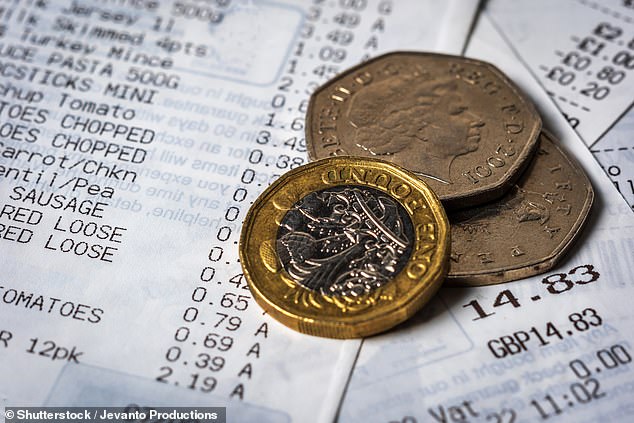[ad_1]
Eating cake rather than bread is not an option. Blame my Viking-cum-Italian genes. But there are two household staples that we are never without: tealights and olive oil. My addiction is such that I’m eagle-eyed about hunting down the best prices.
But here’s the rub. It doesn’t seem to matter whether you are shopping for candles at Homebase or B&M, or Waitrose or Tesco for liquid gold – prices are soaring again having fallen back after inflation peaked nearly three years ago.
As any regular shopper will tell you, so are the prices of most foods and household products.
June’s annual food inflation rate was up at 4.5 per cent, the third month in a row that prices rose, and the highest since the beginning of last year.
Inflation figures for July out next Wednesday are expected to show further jumps. So it’s hardly surprising that 85 per cent of adults surveyed by the Office for National Statistics say that the cost-of-living crisis is the most important issue facing the UK today – ahead even of the NHS.
About six in ten adults also report that costs have risen in the last month – that’s more people citing price rises than in July last year when Labour took office.

Increase: As any regular shopper will tell you, the prices of most foods and household products are soaring
This time around, rising prices can’t be blamed on either the after-effects of the pandemic, which crippled supply chains around the world, or indeed Russia’s invasion of Ukraine, which saw the price of wheat and sunflower oils, as well as energy, rocket into the stratosphere. Today’s price rises, however, are mainly home-grown, the direct result of Labour’s tax hikes.
Prices have further to climb because of the Budget tax rises, as even the Bank of England has admitted.
The British Retail Consortium (BRC) has also warned that the full impact of the last Budget has yet to fully filter through to prices. Labour’s policies will add £7billion to retailer costs this year, ranging from higher employment costs to the new packaging tax.
The BRC also says that if this autumn’s Budget attacks retailers again, with its planned higher business rates threshold on 4,000 larger stores, then it will be poorer families which will be hit hardest.
At the same time, the UK’s farming industry is being whacked on all fronts, threatening the country’s food security.
The latest smack in the face is Labour’s decision not to give any financial aid to the bioethanol industry after President Donald Trump’s tariff hike.
Smaller farm owners are being devastated by the new inheritance tax rules and are shutting down.
Dairy farmers are closing because of higher costs and worker shortages, opening the door to more imports and less competition.
Even the price of bread is now in question. The planned merger between ABF’s Kingsmill and Hovis is going to be an interesting test for Labour to chew on. Both Kingsmill and Hovis lose money. Together they would lead the market in sliced bread, putting them ahead of sector leader Warburtons.
What’s Labour to do? On the one hand the Government will want to show its support for business, giving a nod to the Competition and Markets Authority to pass the takeover.
But that means big job losses and a potential monopoly position for its breads, the price of which they may be mindful of has so often led historically to riots. Telling people to eat cake is not an option.
DIY INVESTING PLATFORMS

AJ Bell

AJ Bell
Easy investing and ready-made portfolios

Hargreaves Lansdown

Hargreaves Lansdown
Free fund dealing and investment ideas

interactive investor

interactive investor
Flat-fee investing from £4.99 per month

InvestEngine

InvestEngine
Account and trading fee-free ETF investing
Trading 212
Trading 212
Free share dealing and no account fee
Affiliate links: If you take out a product This is Money may earn a commission. These deals are chosen by our editorial team, as we think they are worth highlighting. This does not affect our editorial independence.
[ad_2]
This article was originally published by a www.dailymail.co.uk . Read the Original article here. .

